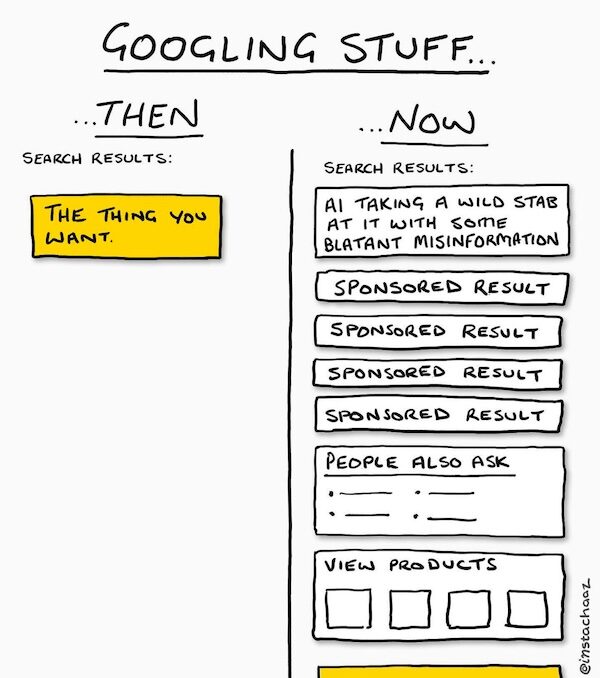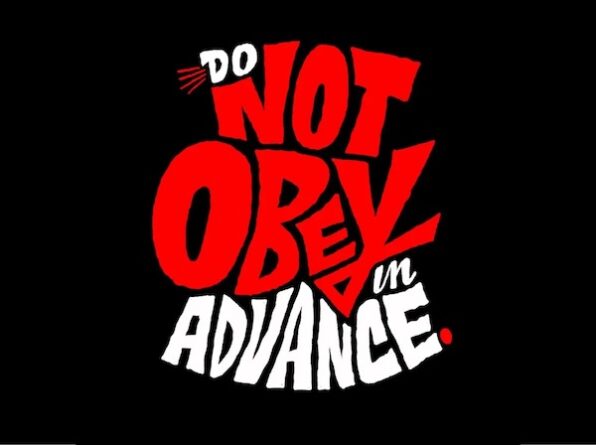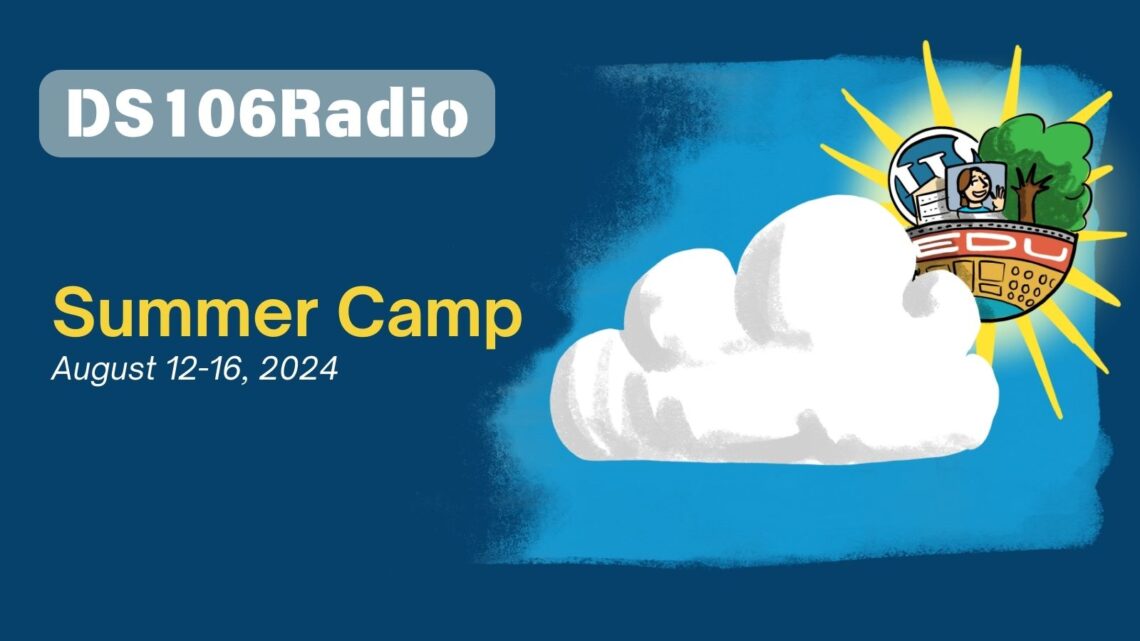higher ed
-
Let’s get specific
Last week marked the launch of a series of reports commissioned by the N-Tutorr project for the National Digital Leadership Network in Ireland. They’re an excellent set of reports, offering high level and practical insights. I’ll look at some of the other reports in a later post, but I want to draw out an element of my own one in this post. My report acted as something of an overview to several others, which then took a deeper dive. I looked at five trends relating to new models of teaching through technology, namely Hybrid and Blended Modes for Learning and Working, Microcredentials, Generative AI, Extended Reality and Adaptive and Personalised…
-
The Enshittification Engine
(Spot on image, update from his earlier version by Chaz Hutton https://www.instagram.com/p/DDbmv-yNijL/) When explaining the concept of enshittification, Cory Doctorow sets it out as the manner in which platforms die “First, they are good to their users; then they abuse their users to make things better for their business customers; finally, they abuse those business customers to claw back all the value for themselves. Then, they die.” It speaks to a general degradation of experience, of the thing that once drew you to a service or platform becoming increasingly lost, amidst adverts, trolls, bad user experience, and principally through a lack of care for the users. This can be done…
-
Universities need to leave X
[Update: I don’t think I made it clear enough that I’m talking about the official comms channels of universities here, not individual academics. They should have left X ages ago.] I’m not the first person to advocate this, but the timing and the case for it now seems even stronger. UK universities (but all HEIs really), need to get off X/Twitter as an official platform now. I have a lot of respect for colleagues in Comms, and they are balancing many different factors. It’s easy for people like me to say it, but much more difficult to undertake as an institutional policy. I get it, but now is the time.…
-
DS106Radio Summer camp – the partial attention conference
I attend quite a few online conferences, and while I appreciate the ease with which you can attend these, they are often victims of everyday work creep – you’ll be reading emails, responding to queries, or dropping out of the conference to attend an online meeting. I always feel guilty about this, and not giving quite the same attention I might in-person (mind you, most conference audiences are looking at their phones and doing the same anyway). I think Tony Hirst used to talk about partial attention during conferences (although I can’t find anything now), where you split your focus between online, which might be online chatter about the talk…
-
Say hello to PEE – your Personal Engagement Environment
I’ve blogged about the Twitter Diaspora, arguing that Twitter was a default place for many in higher education. Alan suggests that the Town Hall was something of a myth, and while there’s probably some truth in that, I would content that, during the 2010s, if you were in higher ed, and active in social media, then you had a Twitter account. You would likely have other platforms also, and maybe some you preferred over Twitter, but Twitter could act as a default engagement platform. That assumption no longer holds true. In a very timely special issue of JIME on social media, Apostolos Koutropoulos and 8 co-authors consider this fragmentation of…
-
The price of process
(Photo by Natalie Cardona on Unsplash) Like Maren, I read David Sax’s The Revenge of Analog last month, and some points in it chimed with some other thoughts I’d been having around AI. The book makes the case around how analogue industries and formats have revived despite their apparent inevitable demise in face of digital alternatives. It is sometimes too keen to reinforce its won hypothesis and ignores counter points (the education chapter had me wincing in places for over-simplification), but overall it marks an interesting reaction to technology. It can be viewed in some respects as an argument against technological determinism, that despite all of these predictions of doom,…
-
Don’t you want me? Questions to ask of new AI-VLEs
In my last post I was doing a backwards glance prompted by the Accenture-Udacity deal. In this one, I’ll look forwards. Apart from the MOOC angle, the other key aspect of the announcement was the investment in AI-enhanced learning environments. In terms of learning environments, the VLE/LMS has been the main player since around 2002. Prior to this there was a mixed economy, combining different commercial solutions, home spun set ups, open web tools. It was both a delightful cottage industry and something of a wild west. From the turn of the century the shift to an institutional wide, enterprise solution became inexorable until by the mid-2000s pretty much all…
-
10 Lessons from Apocalypse literature
As you probably know I spend too much/nowhere near enough time reading horror fiction. I know some people feel that’s kind of juvenile, but after years of challenging myself to read difficult literature, I decided to just enjoy reading. Plus genre literature gets a bad press and people are generally snooty about it. All of which is a precursor to try and justify the number of horror related analogies cropping up in these posts. Speaking of which… I’ve been on an apocalypse literature riff recently – you know the sort of thing, zombies, vampires, ecocide, virus, mutant insects, more zombies. These were nearly all written pre-Covid and its interesting to…
-
Meticulous informality of GO-GN
A few years ago, I used the term ‘meticulous informality‘ to describe what I liked about the ALT conferences. Maren has blogged how it’s a term we’ve discussed since occasionally on dog walks. Both parts of the term are equally important for participants in an event: informality encourages participation and suggests equality; meticulous means care and support. One without the other is not sufficient – just meticulous can be stuffy and hierarchical, and solely informal can be chaotic and confusing. Without it being an explicit intention, it captures our approach to GO-GN also. Having just hosted the largest GO-GN workshop in Edmonton, I know how much time and care goes…
-
The Post Office lessons for ed tech
I expect we’ll see a lot of these types of posts so I apologise in advance for bandwagon jumping. For those outside the UK, there has been a recent TV drama, Mr Bates vs The Post Office, which has dramatised the Post Office scandal, where hundreds of sub postmasters were falsely accused (and convicted) of fraud because of a faulty accounting system that was rolled out in the 00s. The TV series has caused fresh outcry, actions and recriminations, and is probably one of the most important drams made in the last decade or so. Like many people I had vaguely followed the story, but not until the TV series…









